Cats have a lot of excellent traits that make them great pets, from their graceful movements to the fact that they are generally quieter than dogs. But the real question is: are cats a lot of work? Kittens and young cats will definitely require a lot of attention and time to ensure proper healthy development. However, as these young cats get older, they gradually require less maintenance as they grow into routines and habits.
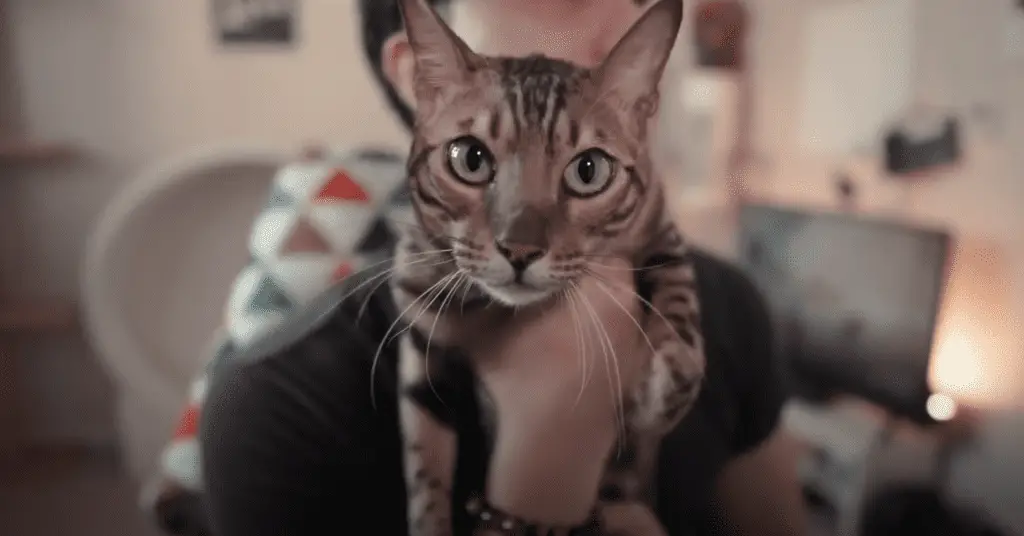
Cats don’t need as much attention as dogs. However, cat parents still need to attend to certain aspects of a cat’s life, such as environment, diet, and routine. From kittens to elderly cats, you’ll learn how much work is involved in caring for them in this article. Excited? Let’s get to it!
Are Cats a Lot of Work? Cat Ages & Attention Required
Living with a cat is different for every owner as cats are all individuals and have their preferences and personality. However, what is common for every cat are the instinctual/behavioral requirements to have a fulfilling life.
| Age of Cat | Attention Required (Time & Responsibilities) |
|---|---|
| Kitten Stages (0 – 1 year) | High to moderate attention required: A kitten requires a lot of attention and must be trained just like a puppy, especially if it doesn’t have playmates. |
| Young Adult (1 – 6 years) | Moderate attention required: Young adult cats are relatively more independent but still require training. Although they will require less than kittens, they will still need hours of attention for enrichment. |
| Mature Adult (7+ years) | Moderate attention required: Mature adult cats are more independent and require less supervision. |
| Senior (10+ years) | High to moderate attention required: Senior cats will need a lot of love and care because they are more prone to age-related illnesses and pains. |
Kitten Stages (0-1 year)
The kitten stage encompasses birth up to six or seven months of age. If you decide to adopt a cat this young, you will influence its personality and habits until adolescence. Your future relationship with your cat will largely depend on how you nurtured and trained it during its younger years.
During the first few weeks of a kitten’s life, you can take comfort knowing that its mother will care and provide for its basic needs. Mothers can teach their kittens the skills they need to survive.
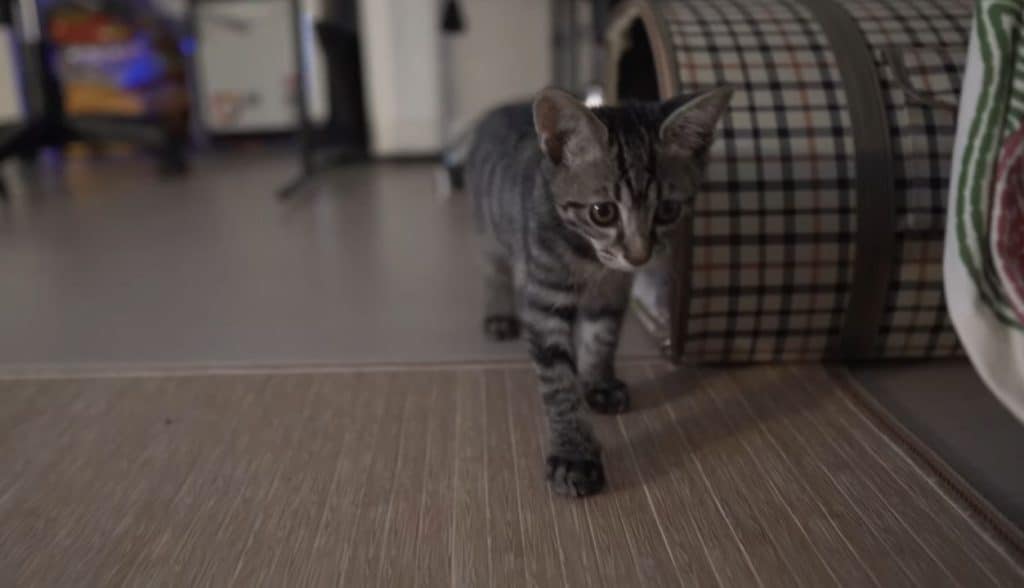
After your kitten is weaned from its mother and lives with you permanently, kittens need as much attention as possible. Thus, It would be best to create an environment where the kitten can feel safe and comfortable.
The cat will undergo more mental and physical change throughout the kitten stage than it ever will. Owners must dedicate time and resources to the following responsibilities to raise a confident and friendly cat in the future. For the full comprehensive guide on how to care for kittens, detailed responsibilities, and what to do for each stage of your kitten’s life, read the article here!
Kittens: Crucial Responsibilities for Cat Parents
- A kitten will need veterinary check-ups at least once a year. If proven to have health conditions, more frequent visits will be required.
- The kitten stage is also where sterilization can be discussed with the veterinarian. You can spay your female feline friend or neuter your male kitten.
- You also need to look out for specific health and genetic conditions in your kitten breed at this stage. For example, Persian cats are prone to breathing issues and eye problems because of their flat faces.
- Owners also need to watch what their kittens are eating and the amount and frequency they eat; first, delve on wet foods together with their milk formulas before moving to dry kibble as they grow into the junior stage.
- To raise confident and friendly cats, it is vital to introduce kittens to people and other pets. Socialization is critical at this stage.
- Introducing proper play methods without using your hands and feet as toys will keep them from future aggressive behavior.
- At this early age, it’s best to get your kitten used to grooming practices like getting its nails trimmed, brushing its fur and teeth, and keeping it in its carrier when you travel.
- To develop proper toileting habits, kittens must be trained as early as possible to use litter boxes.
- To keep your cat’s teeth healthy, the kitten stage is the best time to get used to mouth handling when brushing and wiping its teeth.
- Year-round treatment to prevent ticks and heartworms is essential to protect your cat from parasites.
Young Adult Cats (1-6 years)
A cat’s young adult years are commonly known as its junior or prime stages. This stage is where inter-cat aggression may come in, especially if you have more than one cat in the house. For this reason, experts recommend adopting two kittens at once so they can grow up together.
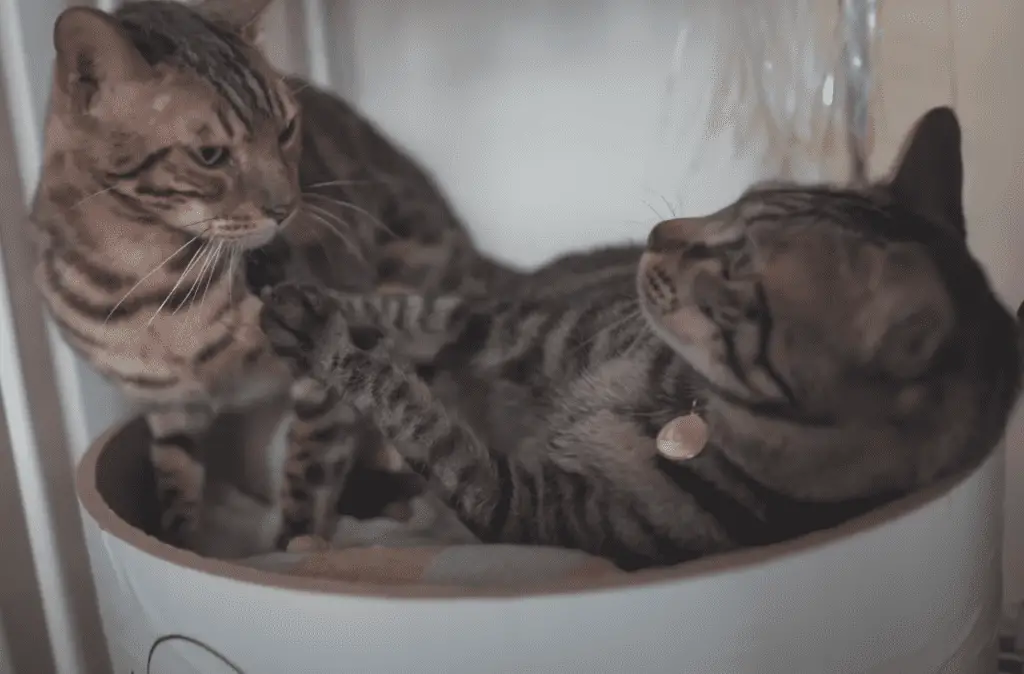
Young Adult Cats: Crucial Responsibilities for Cat Parents
- Young adult cats will need at least one vet checkup a year. More visits are necessary if they are diagnosed with health problems in their kitten years.
- If you have adopted a cat at this age, take note of subtle signs and changes in their behavior. These could indicate chronic illness, stress, or pain.
- At this age, cats are prone to wandering out of the house. Look into microchipping so that you can track down your cat if it gets lost.
- Other common medical conditions in this stage are vomiting, diarrhea, hairballs, and changes in behavior. Keep track of all of them and report everything during veterinary visits.
- Risks of weight gain and obesity are also common for this age group. As an owner, it is your responsibility to ensure proper diet and nutrition coupled with exercise and adequate play.
- If you have had your cat for years, expect changes in how it interacts with you in this age group.
- Remember to remain gentle when grooming your cat, especially if it did not grow up used to its fur and claws being handled.
- Make sure that your cat knows where its litter box, bed, water, and food are kept in your home. Do your best to establish a healthy routine and familiarity with your household.
- Your cat will grow dramatically in length and weight at this stage. Make sure its litter box, cat bed, collar, and other accessories remain comfortable for its size.
- Cats require daily exercise and a way to practice their hunting abilities. You can install a cat door to encourage outdoor activities or build a cat tree for climbing.
- Positive reinforcement should be encouraged, especially when teaching a new adopted young adult cat proper littering.
- Talk to your vet about the best dental food your cat needs at this age.
- Treatment for parasites such as intestinal worms and fleas is also advised.
Mature Adult Cats (7+ years)
Mature cats are seven years and older, and they have already established their personality and temperament and are less likely to need supervision by their owner. They are also much less likely to indulge in big bursts of energy for play.
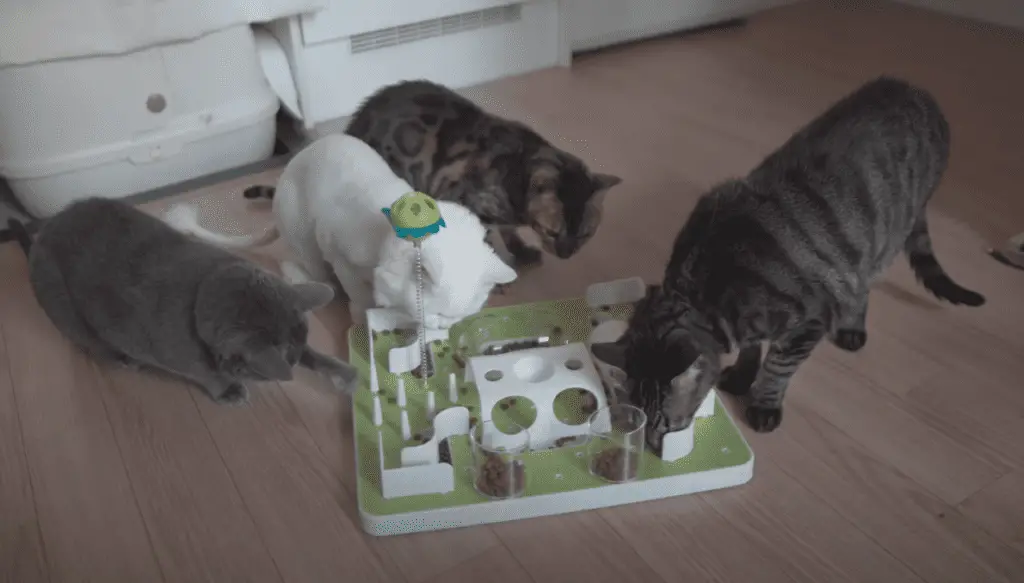
If proper hygienic habits were not established in their earlier years, mature cats will likely have more medical problems that would require complex treatments.
Mature Adult Cats: Crucial Responsibilities for Cat Parents
- Watch for subtle behavior differences in your mature cat that may indicate whether it is feeling ill or is in pain. These can include changes in appetite and hydration, vomiting and diarrhea, less vocalization and increased nighttime activity, changes in mobility and eyesight, and a shift in litter box and grooming habits.
- Vet checkups must focus on your cat’s abdomen, lungs, heart, kidneys, eyes, teeth, and thyroid. An intensive muscle and bone assessment will also help if your cat suffers from arthritis.
- Mature cats are also more prone to weight gain than when they were younger, so owners must focus on their diet. If your vet prescribes a specific diet, make sure to follow it.
- Make sure that your older fur baby is comfortable in its environment. Little things such as easier access to the litter box, a warm and softer bed are just some of the ways to make its life much easier.
- Make sure that your cat has no dental problems by keeping an eye on how it eats and chews.
- Like the kittens and the young adult cats before them, mature cats also need treatments to ensure that they have no parasites.
Senior Cats (10+ years)
Senior cats have reached the ripe old age of 11 to 14. These felines are in their golden years, and it’s perfectly normal for them to sleep a lot more and be much less active than their younger counterparts.
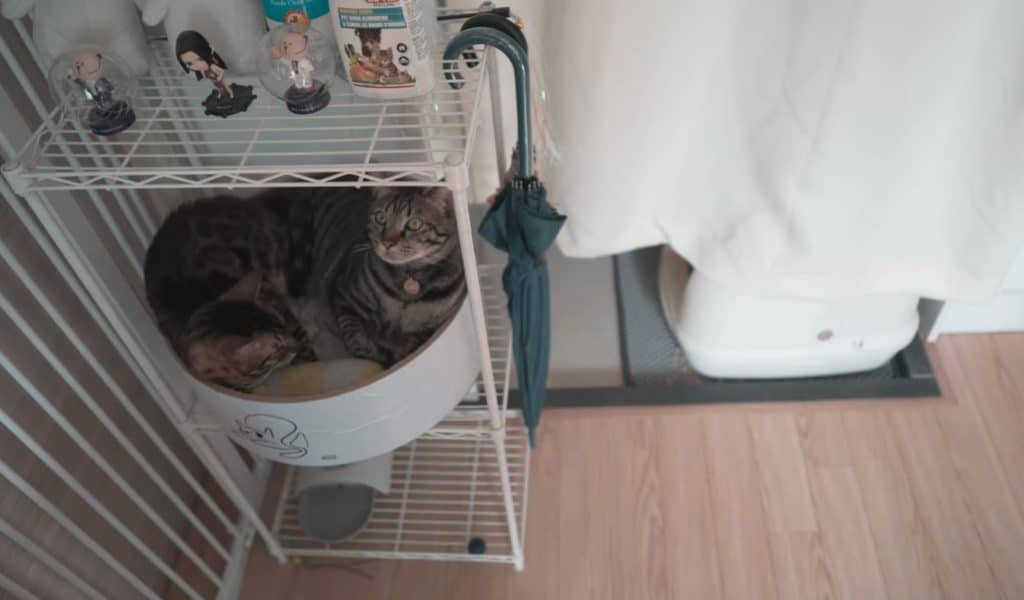
If your cat has managed to stay healthy all these years, the senior stage may inevitably afflict it with age-related issues. Sadly, this is the last stage of every cat in its long and full life. Guaranteeing that they live their best life possible full of love and comfort is the best possible thing an owner could do.
Senior Cats: Crucial Responsibilities for Cat Parents
- Senior cats require at least one checkup every six months. Complete lab work is needed each time to ensure that every issue is covered, and the veterinarian can recommend the best possible regimen for your cat to follow. Most regimens include a diet of less fat and significantly fewer calories to counter your senior cat’s lack of physical activity.
- Issues such as reduced mobility and weaker hearing and vision will occur as cats grow older. It is an owner’s responsibility to make sure that everything they need is easily accessible.
- Watch your cat for any subtle behavioral changes that may indicate a need for intervention with its health issues.
Other Frequently Asked and Common Questions
Should I Adopt a Kitten or Adult Cat?
The choice of getting a kitten or an adult cat is very much dependent on you and your lifestyle. Get a kitten if you have plenty of energy to raise one. A kitten is the best choice for you if you want that experience of watching your kitten grow and playing a vital role in its development and overall wellness.
You must be willing to devote a considerable chunk of your time to raising a kitten. Be prepared to kitten-proof your home, learn about cats and their personalities, and embrace this opportunity to raise a young pet.
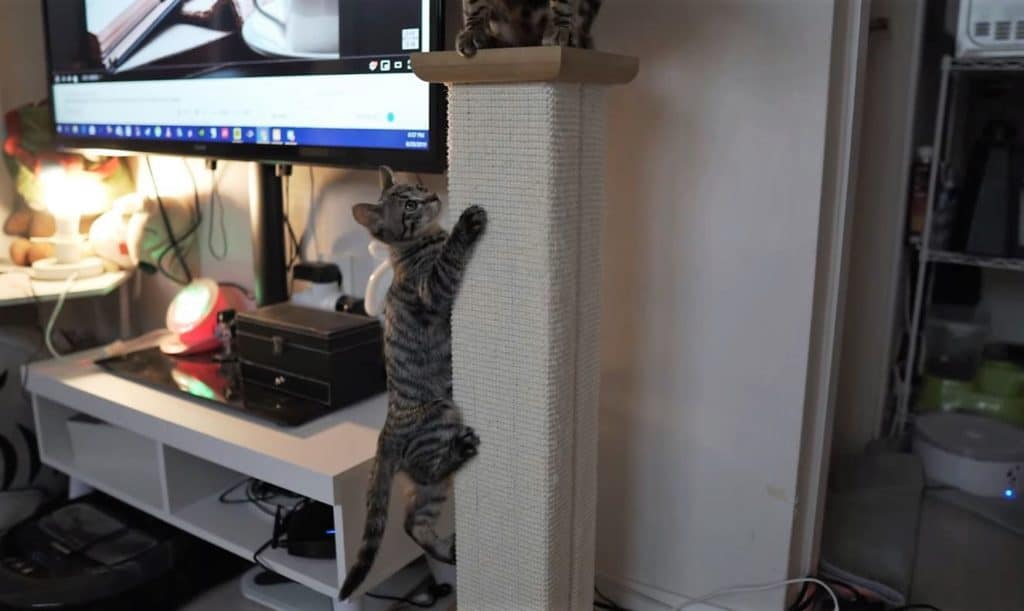
Bear in mind that part of creating a loving and secure environment for your pet is being physically there to take care of your kitten. You need to have the patience to let your kitten learn and make mistakes, and you must indulge its need for cuddles and attention on top of the necessary meal times and vet visits.
Having a kitten is a perfectly good excuse to invest in cat toys and other accessories it may need. If you are a new feline parent, remember that kittens grow up quickly, and their things need to grow up with them.
Make Sure You Have Enough Time to Devote to Your Kitten
Getting a kitten solely because of its cuteness and playfulness is not a good enough reason, and it’s best to reconsider. In just a few months, your once tiny and adorable kitten will transition into a more laid-back and mellower young adult. A kitten growing into a healthy older cat with a good personality is one of the most fulfilling experiences any pet owner can have.
On the other hand, an adult cat may be a perfect match for you if your routines and lifestyles are already established. An adult cat would appreciate the calmness of your home, so it won’t mind being left alone when you have to go to work.
Adult cats are also more patient, so they are the ideal choice if you have kids in your household. Your cat will know when to stay away from rowdy children and when to come close for cuddles.
Older cats can be very independent. They will want your attention once in a while, but they become occupied with their own world and will not be as clingy as when they are younger.
Can I Have a Cat in a Small Apartment?
It’s entirely possible to raise a cat or multiple cats in an apartment (It’s what my whole blog specializes in!). In a small space or apartment, cat parents will need to implement good routines for their cats (see meal and play scheduling) to prevent unwanted behaviors. Additionally, environmental enrichment and stimulation become more of a focus.
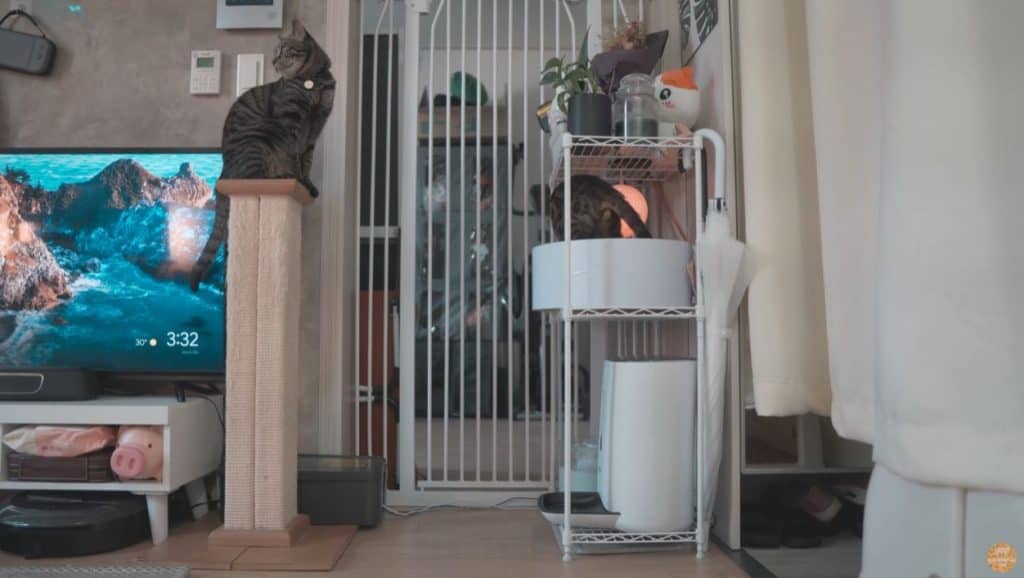
Here are some guides that will help cat parents that are living in apartments:
- Beginner’s Apartment Cat Guide
- Apartment Litter Box Solutions
- Cat Hair & Shedding Management
- Minimizing Cat Odors in Apartments
- Ideas For Cats in Apartments
Should My Cat be Indoors or Outdoors?
Indoor cats tend to live longer—up to 15 years old or older. In contrast, outdoor cats have shorter life spans because of many factors outside the home, including wild animals and car accidents. They also have more chances of exposing and acquiring feline leukemia virus and feline immunodeficiency virus.
Getting an outdoor cat is ideal if you cannot give it your utmost attention every day. It will have more freedom to move around and entertain itself and only come home when you are around to entertain it. However, be prepared for everything that might happen to your cats outdoors as things can happen fast and suddenly!
Should I Adopt a Male or Female Cat/Kitten?
For the most part, whether your cat is male or female won’t matter once you have it spayed or neutered. The procedure will limit its aggressiveness, improve its temperament, and generally prevent hormones from getting in the way of your cat’s actual personality.
Male and female cats do have some slight differences when it comes to their behaviors. To help you with your decision, I wrote a comprehensive guide on cat genders here! Truth be told, a cat’s needs for attention ultimately depend on its temperament and its relationship with its owner, regardless of its sex.
